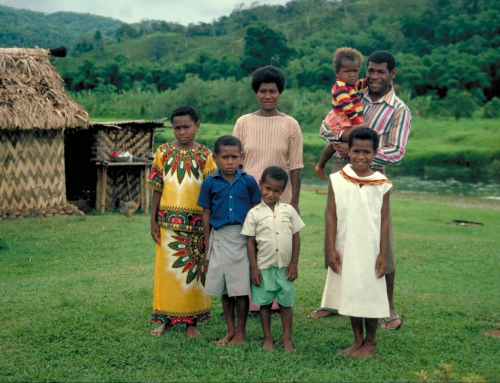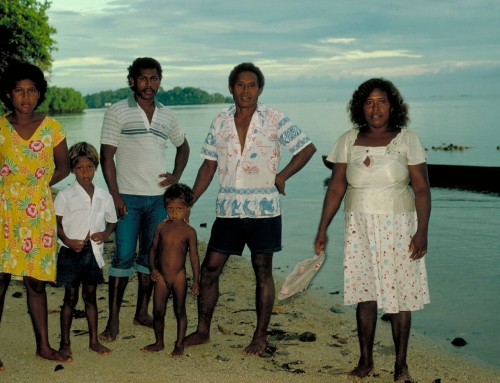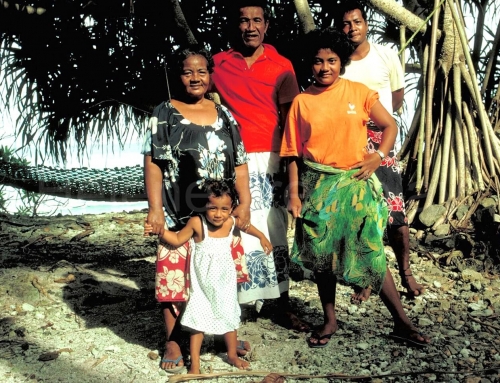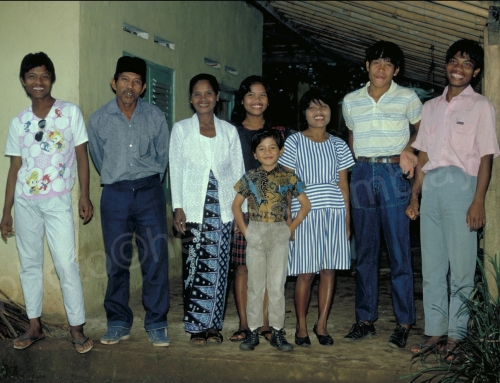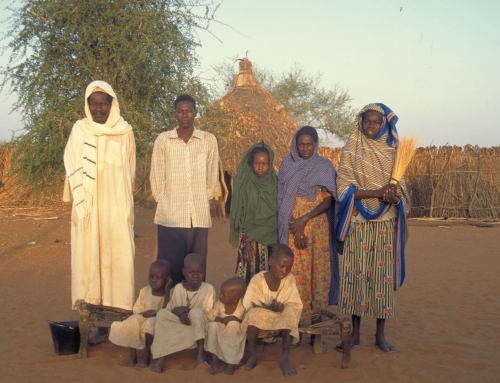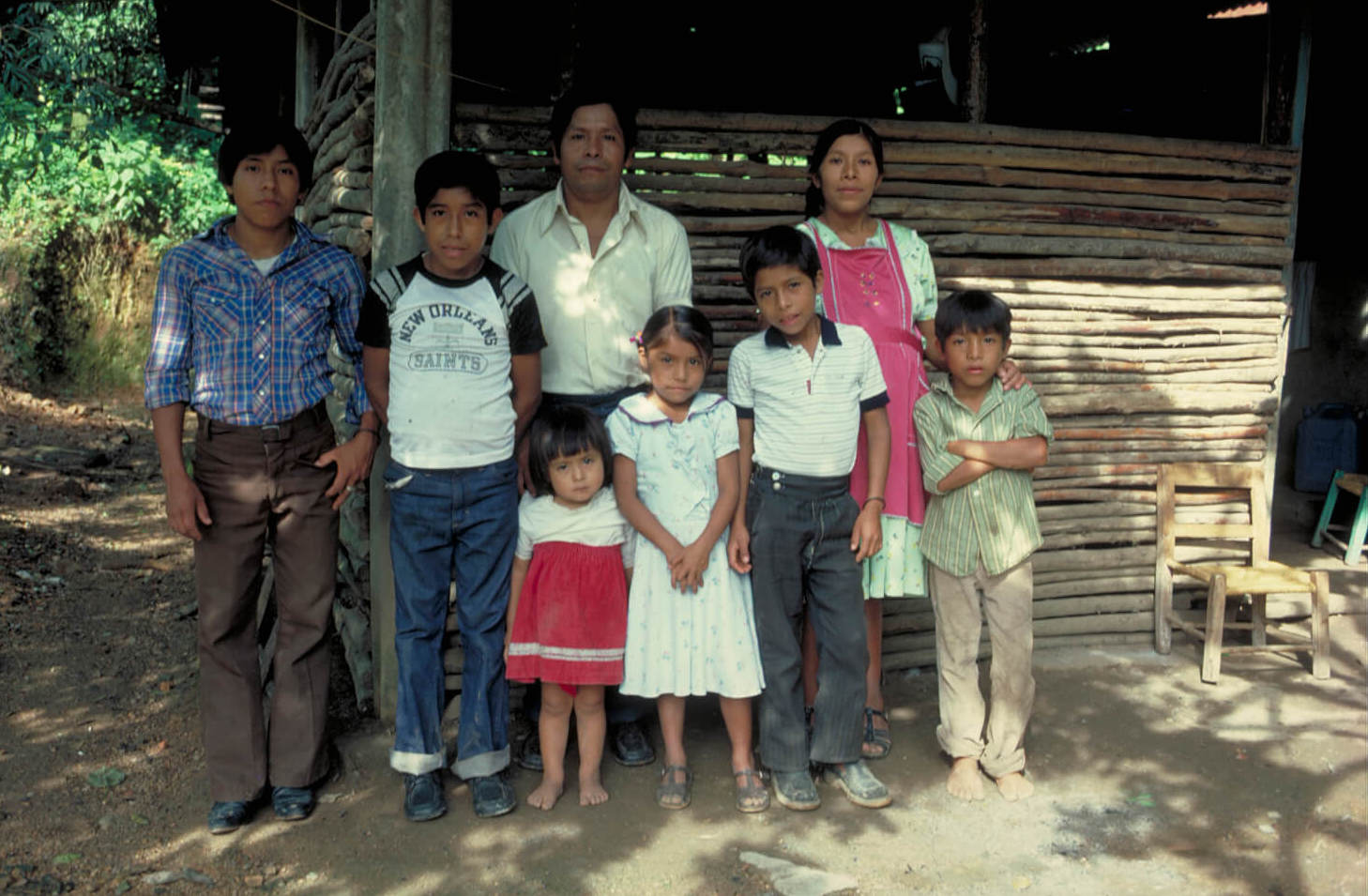
THE GARCIAS HERNANDEZ FAMILY
Sixto Hernandez, age 44
Maria Catanina Garcias Hernandez, 34
Reyes Garcias Hernandez, 16
Alfredo, 14
Gerardo, 10
Francisco, 8
Angelica, 8
Pascuala, 21h
2 chickens
2 turkeys
1 pig
3 cows
4 ducks
1 dog
TANCUILIN
Septembre 25, 1984
Sixto is determined that all his family will be well educated
5:00. The call of nature awakens Pascuala. In the darkness, her mother, Catanina, hunts on her hands and knees for the flashlight on the Boor. She switches it on and accompanies her toddler outside to squat on the ground near the door. This wakes the boys, lined up in a row like onions on the kitchen Boor. Sixteen-year-old Reyes gets up to pile twigs inside the three stones that form the hearth. He lights the fire, places the pot of water on top, and goes back to bed
The cane-and-thatch house of the Garcias Hernandez family perches on the green slope of a mountain in the Huasteca region of central Mexico. A dirt path leads down from the house to the main road winding through groves of orange trees and along a river. The family’s two teenagers descend every morning, Alfredo on foot for high school in Chipolco and Reyes on a wobbly bicycle for the technical college in Halpila.
6:30. After sharing morning coffee with their father, the boys leave for school. Sixto is determined that all his family will be well educated. An uneducated farmer, Sixto grows enough corn, coffee, avocados, and bananas for the family’s consumption and enough oranges to sell. Yet two days a week, to make ends meet, he hires himself out as a laborer to large landowners. “Picking oranges is a lot of work for only a little profit,” says Sixto. “We must carry them on our backs all the way to the main road to sell them to wholesalers. I don’t understand why everything I buy gets more and more expensive, but I never get more for my oranges.”
Picking up his machete, Sixto leaves the yard for the elementary school. One day a week, he volunteers to work for the community. This morning he and another local man will prepare adobe and patch the holes in the classrooms’ walls. Ten-year-old Gerardo and eight-year-old Francisco will soon follow their father up the mountain. But before they leave for school, they bring water to the three cows that are grazing in a small pasture surrounded by orange trees.
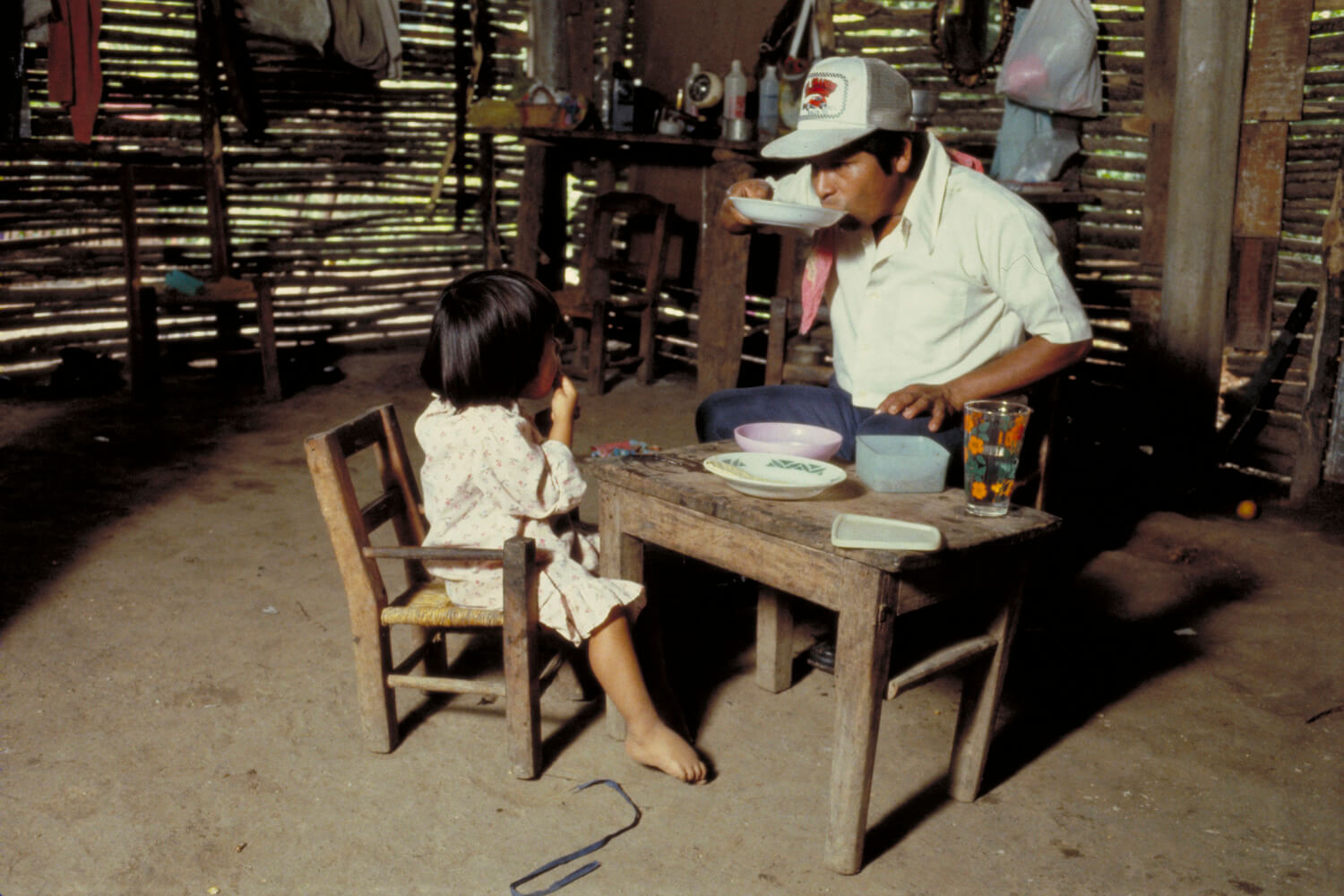
Pascuala refuses to go to kinder “It’s so boring.”
8:00. Pascuala follows her mother around the house and pretends to share in the housework. The little girl’s greatest delight is imitating her mother. Today she has refused to go the kinder (nursery school), which is adjacent to the elementary school. “It’s so boring,” she exclaims. Her gentle and patient mother lets her do as she pleases.
Catanina’ s friend stops by. She has walked for two hours to bring her nieces to school. Catanina ties up Angelica’s hair. She surveys her critically and nods, knowing her daughter will pass the teacher’s inspection for clean hands, hair, and clothes. The three girls leave for school on the dirt road that winds its way up among the houses. It has started to drizzle, and the path is becoming slick and treacherous. Catanina, her friend, and Pascuala sit down to clean and sort beans as the final schoolbell rings.

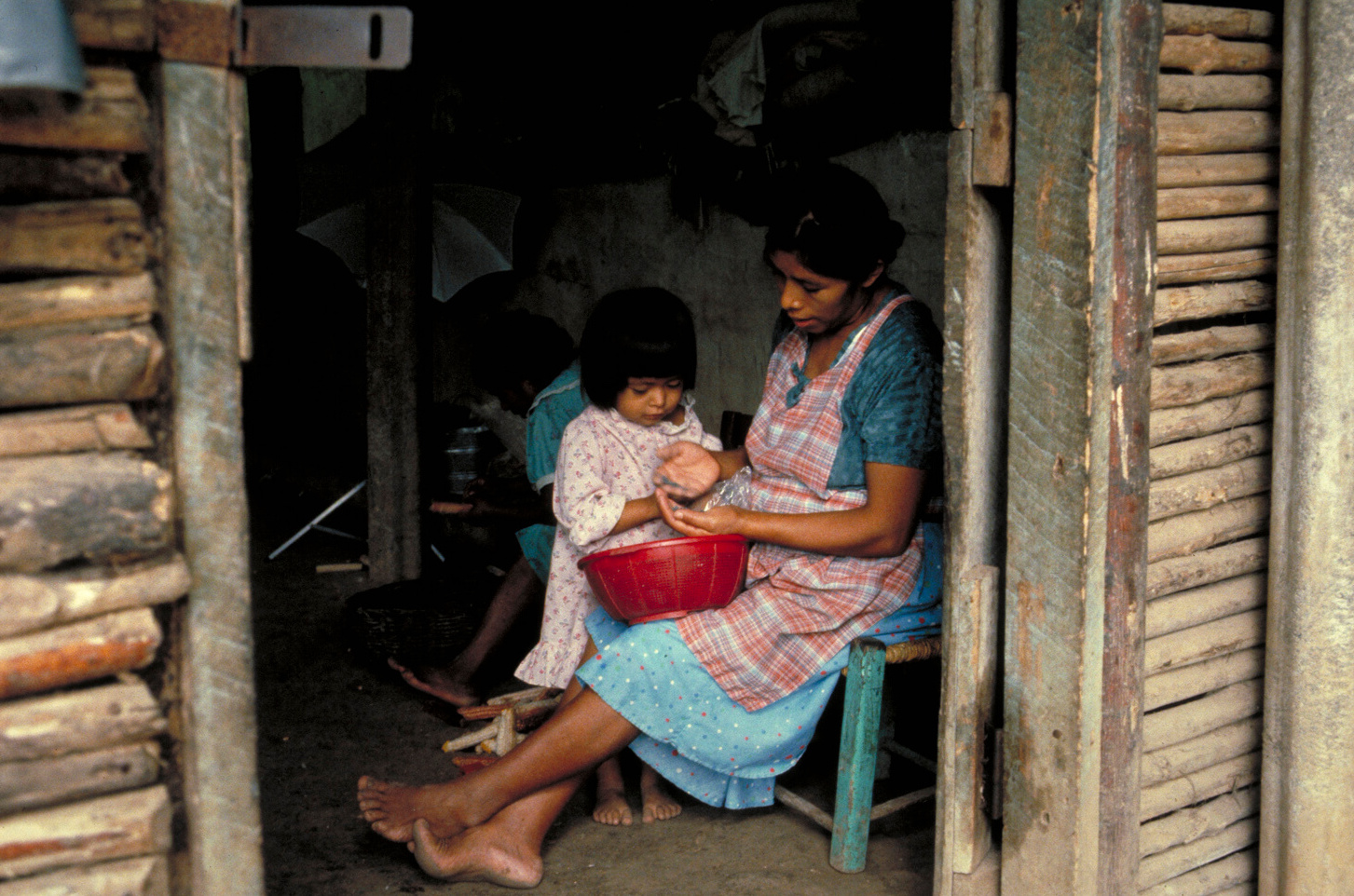
10:00. Catanina rolls out the com dough on the flat stone to make it smooth so that the tortillas will be soft. She could use the press to Batten them, but Sixto prefers tortillas made the oldfashioned way, by hand. Those are the best! Catanina proves him right.
With its walls of blackened cane, the kitchen smells of charred wood and smoke and the frijoles simmering on the fire . Today Catanina will make an omelette with mushrooms which her friend picked in the woods on the way down to school. Mother and daughter chat as they prepare the meal. Each day Pascuala learns new words in Spanish or Nahuatl, her native language. Her colorful conversation never fails to amuse Catanina, who bursts out laughing as she clasps her belly, where the next child is already stirring.
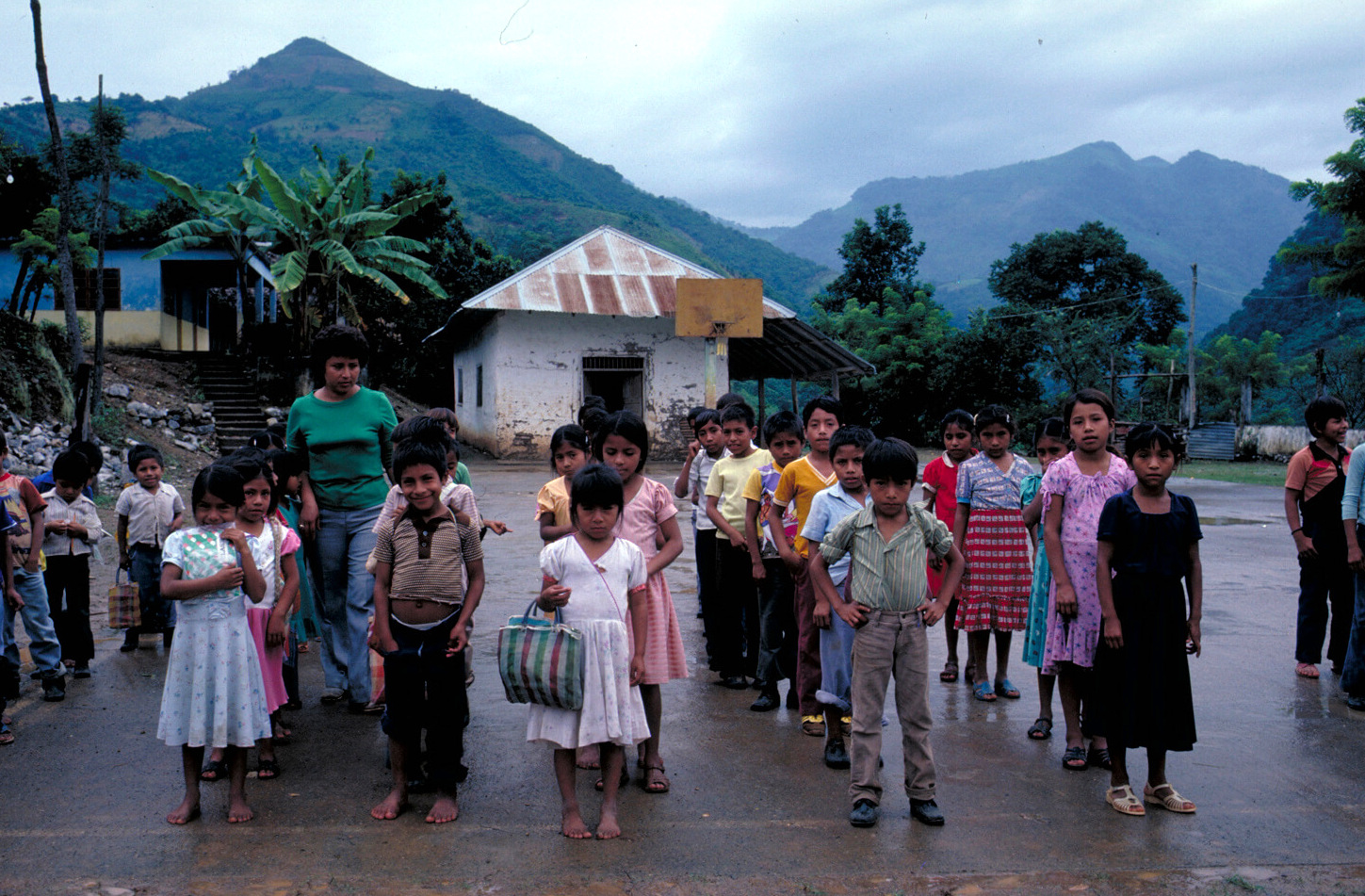
10:30. The bell rings for school recess and a midmorning meal. The children run down the mountains in the pouring rain. In each house rice and beans are waiting for them. They eat heartily and leave as quickly as they arrived.
11:30. Sixto returns and sits next to the only table in the house; it is so low that he cannot slide his knees underneath. In front of him, Pascuala drinks black-bean juice and continues her monologue. A torrential rain falls on the house. The ducks huddle on the doorstep and the chickens take shelter inside. Slowly and calmly, as is her nature, Catanina lets down her hair and combs the long tresses. Unable to resist his little girl’s charm, Sixto breaks into hearty laughter.
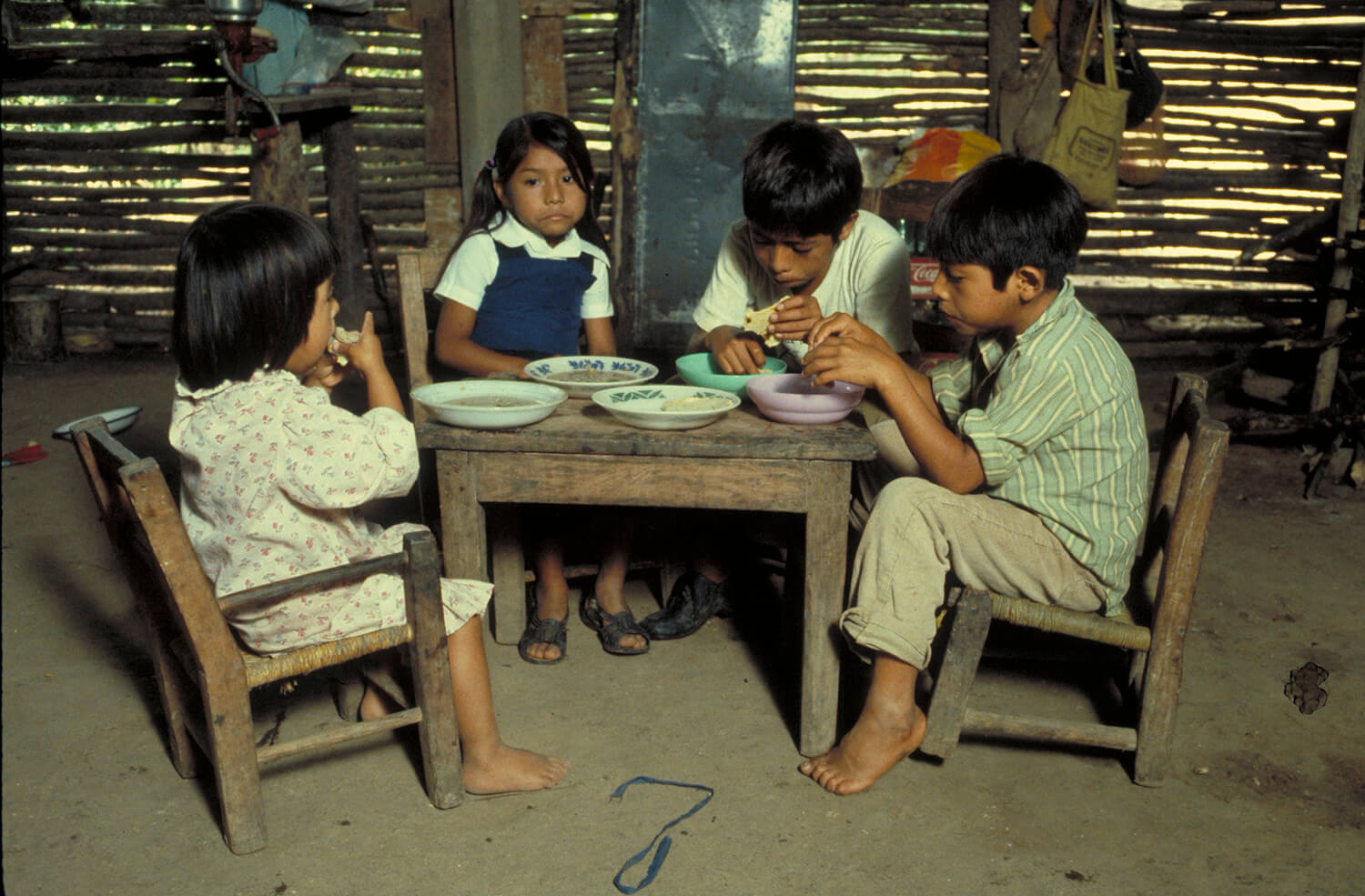
1:00. School is over and the children tumble down the muddy track shouting at the top of their lungs. Gerardo and Francisco race up the meadow to milk the cows and bring back a pail of milk that Catanina will sell to the neighbors. Angelica goes down to the river to fetch water, returning with one heavy bucket on her head and another in her hand. Catanina reheats the beans for her hungry teenagers and has the oldest one chop wood for the kitchen fire.
Sixto goes back to the elementary school. The new doctor from the regional clinic is coming to meet the men and to discuss the importance of obtaining medical assistance for their families. The school principal will also be present to remind the fathers that school is compulsory for their children and that the early school years are the most important for their development. Too often the peasants keep their children home to work.
3:00. Catanina leaves for the river with her children. She washes their clothes, imitated by Pascuala. Angelica washes the com for tomorrow’s tortillas, while the boys fool around. They soap themselves and rinse off by diving into the water. At this hour . of the day, the riverbank is a lively place. Most of the families on the mountain slope are here. The river runs swift and wide. Indians from the opposite side have difficulty crossing it in their small boats. They come to the settlement to buy rice and beans and then make the equally laborious return journey back to the mountains, where they live in extreme isolation.
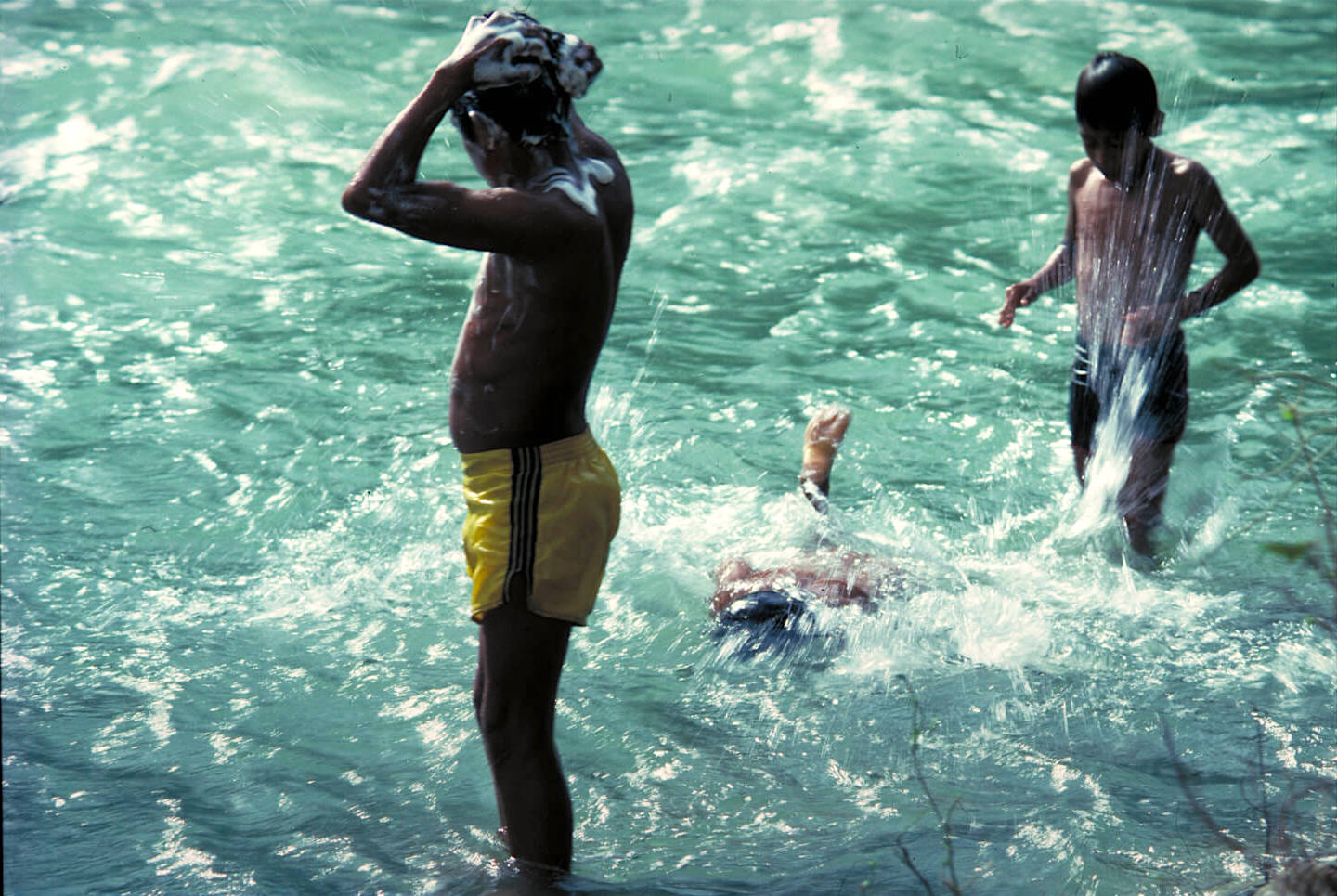
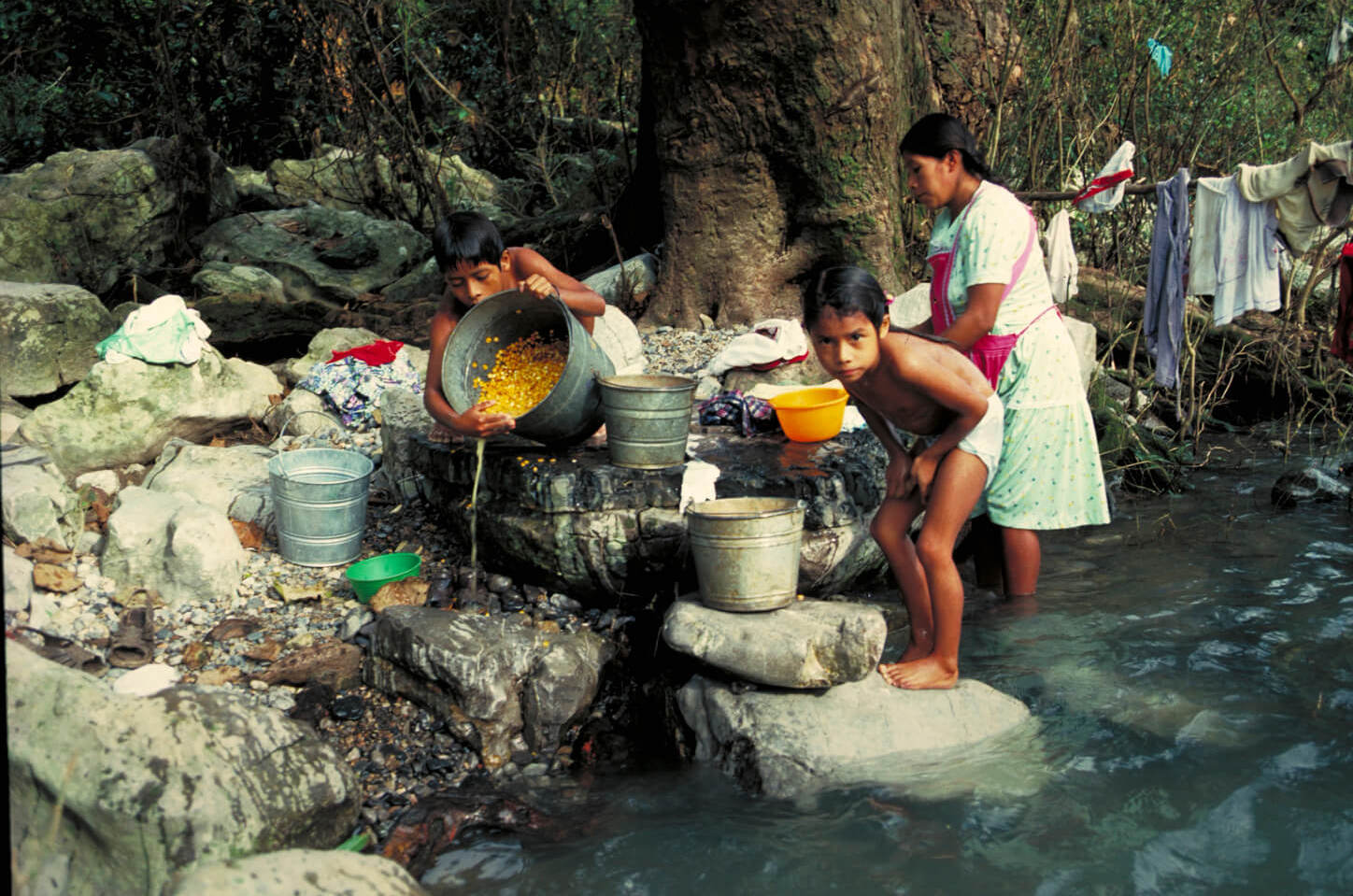
16:30 Everyone is sparkling clean. They climb back up to the house, the girls carrying the washing and com and the boys a pail of water. No one ever comes home from the river empty-handed.
5:30. Alfredo and Gerardo take turns grinding the cooked com and making dough for the evening tortillas. Once in a while, they toss a handful to the chickens and to Mariposa, the dog, who watches their every movement. Catanina hangs out the washing, hoping that it will not rain again. Angelica hands her the clothes, singing over and over the chorus of a hymn learned at school: “Gracias a Dios” (“Thanks Be to God”).
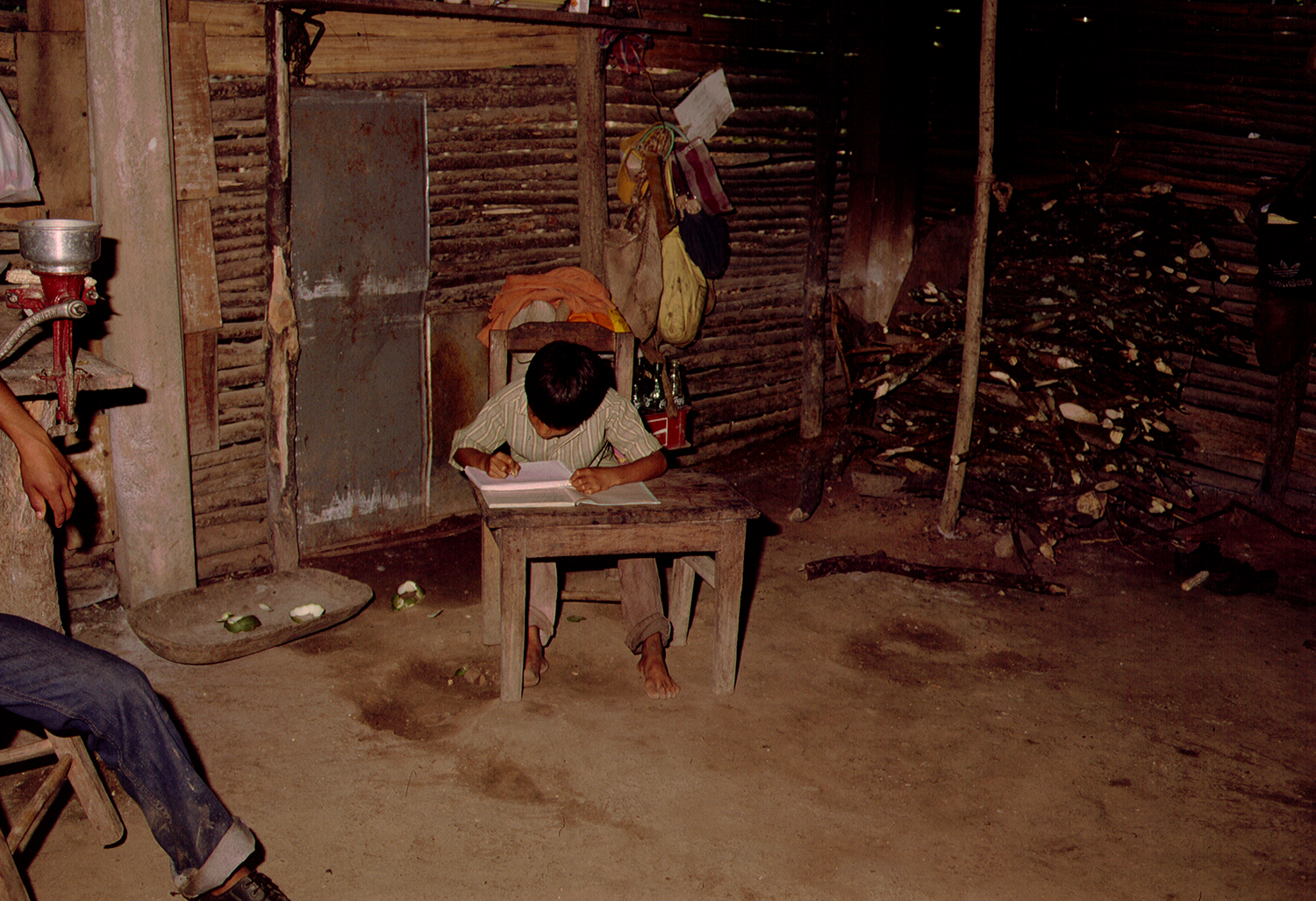
6:30. No sooner are the tortillas and eggs ready than a plate is held out. It is dark by the time Catanina can sit to eat her portion. The family does not want to waste a candle. Their eyes gradually grow accustomed to the darkness, where dim shadows perched on Lilliputian chairs can only just be made out. The conversation continues in the darkness.
8:00. On her hands and knees, Catanina lays out the mats and blankets on the concrete bedroom floor. She sleeps there with Sixto and their two daughters. The boys prefer the coolness of the kitchen’s dirt floor. For another half hour, they listen to the tinny radio, argue, and burst into noisy laughter. Pascuala is lying near her mother, tossing and turning in her sleep. In her calm voice, Catanina tells everyone to be quiet. Without a complaint, they all obey.


